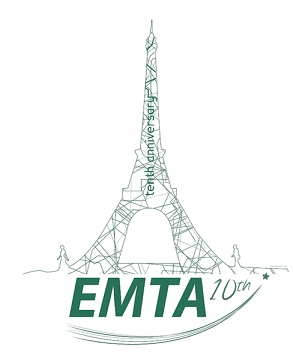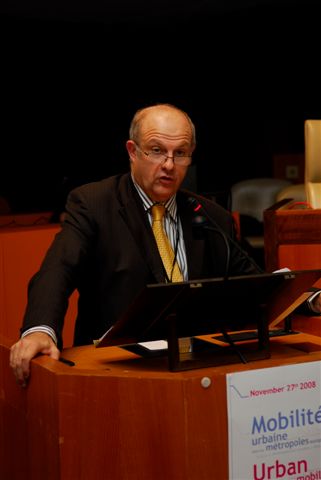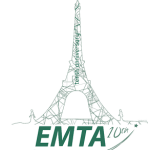On November 2008, EMTA celebrated 10 years
of activity in the field of Urban transport with
a conference held in Paris at the invitation of
STIF and the Regional Council of Ile de
France.

President of Region Ile de France
Jean Paul Huchon and Vice President Serge
Mery and Director General Sophie Mougard
deserve the warmest thanks for their
outstanding hospitality and friendly welcome
of all EMTA members to this special event.
The event culminated with a conference
with two distinguish speakers Gilles Savary
member of European Parliament chairman of
Transport and Tourism (TRAN) Committee
and Eleni Kopanezou Head of Clean and
Urban Transport at European Commission
DG-TREN. Here are highlights of their
speeches.
Gilles Savary presented himself as the
TRAN Committee rapporteur on the coming
Action Plan of the European Commission
(EC) and said that European Parliament (EP)
will study the report in due time hopefully
allowing an agreement of EU institutions
before the elections of June 09.
The first reading of report is in February, the
validation vote of TRAN is foreseen in March,
and final vote of plenary session in April.

Savary reminds the way EU touched upon
Urban Transport, was primarily through
tendering procedures and contract awarding regulation. However, thanks to the growing
environmental concerns since 2007, EC started
to apply its attention to Urban Transport.
Savary underlined the subtle exercise performed
by EC in the Green Paper towards a New
Culture for Urban Mobility considering the
subject in itself touches upon a very sensitive
prerogative namely the subsidiary principle,
one important point of the report to come.
The second main point is about urban planning.
Within 2020, 80% of Europeans will live
in urban areas meaning Public Transport will
represent an overwhelming part of the
transportation system in the metropolitan
area, quite a challenge for what is at
stake is Mobility for citizens.
Savary sees the coming Action Plan more as
a first step in the long way to go to achieve
Sustainable Urban Mobility than a wrap up
policy document. He also sees EMTA as an
important partner all along the road with
even an increasing role to play.
Acknowledging time has come to emphasize
the EC initiative for combating climate change
he stated he would particularly stress in the
initiative report the crucial role of Public
Transport in contributing to the “climate
package”.
In the opinion of Savary, the Action Plan can
follow 2 directions, since ruling by way of
imposing legislation is out of question.
One is the now usual for EC delivery of
guidelines including a list of recommendations
on specific subjects, benchmarking opportunities,
exchange of good practices and monitoring, evaluation and follow up. This will contribute
to build a wide observation and practice
exchange. The alternative could be to draw
an integrated EC programme dedicated to
Urban Transport, instead of counting
only on CIVITAS funds (from EC Research
Programme) combined with structural or
cohesion funds which aren’t evenly distributed.
Possibly consider cross funding to allow
financing other measures as well.
EP must however seriously embrace the
problem of financing Public Transport, there
are several ways to explore. Besides, the
present economic crisis provides an opportunity
for changing habits in terms of financing.
Although Savary doesn’t expect a dramatic
overnight change towards a dedicated urban
transport significant fund, he thinks it would
be relevant to contemplate the feasibility, for
there are real immediate financial needs to
cover besides the one of the automobile
sector, and consistency should be reminded
at the political level.
Finally, stressing the importance of EMTA
advocacy not only towards EC but also
towards EP, as MEPs will take more and more
responsibilities in the field of Urban Transport
(co-decision process), Gilles Savary calls for
and welcomes contributions from EMTA
members – either on behalf of EMTA or on
behalf of own national/regional governments –
expressing interest and recommendations they
wish to see in the initiative report.
Eleni Kopanezou acknowledges the
valuable input from STIF and Ile de France Region
and from EMTA members to the Green Paper
that EC took very seriously into consideration.
EC indeed was very cautious to touch upon
Urban Transport making exceptions in the
90’ for research and demonstration or
exchange of goods practice in cities. The Air
Quality directives was a first step, then came
the Green Paper emphasizing clean urban
transport, which was followed by a large
consultation of all stakeholders. By the time
outcomes were disseminated, the subsidiarity
question was no more of a problem but
rather a challenge, one that could help make
things happen.
Mrs Kopanezou stresses that EC does work
with all levels of governance, Member States,
regional representatives and cities representatives,
so as to enhance its understanding of
what it takes at local level to implement policy
measures taken at higher level and turn
them into daily life reality in the cities.
EC wants to avoid dictating solutions but is
convinced that it can help local governments
to overcome barriers mainly by supporting
and guiding through a stream of information
on good practice. In doing so, EC would help
reduce costs and avoid reinventing the wheel.
The coming Document Action Plan, short
and concise (around 12 pages) is supposed
to answer the questions raised by all stakeholders
and provide the relevant tools. So far,
DG-TREN has avoided proposal of legislative
document, on the contrary several practical
guidance documents will be issued as a
proposed support for local authorities.
The document enhances a comprehensive
approach integrating all levels of governance and
places Urban Transport (not only passengers but
also freight) in the full chain of transpor from
Trans-European Network TEN to local networks.
Special attention is given to land use planning
and urban planning in the Action Plan the
philosophy is to build on “the thematic strategy
for the urban environment”
Finally Mrs Kopanezou mentioned the interest
of Commissioner Tajani (expressed in the
CIVITAS forum in Bologna Nov 08) to open
the dialogue about financial instruments for
Urban Mobility.
Proceedings of the Conference in English

